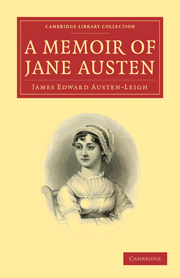Summary
SELDOM has any literary reputation been of such slow growth as that of Jane Austen. Readers of the present day know the rank that is generally assigned to her. They have been told by Archbishop Whately, in his review of her works, and by Lord Macaulay, in his Essay on Madame D'Arblay, the reason why the highest place is to be awarded to Jane Austen, as a truthful drawer of character, and why she is to be classed with those who have approached nearest, in that respect, to the great master Shakspeare. They see her safely placed, by such authorities, in her niche, not indeed amongst the highest orders of genius, but in one confessedly her own, in our British temple of literary fame; and it may be difficult to make them believe how coldly her works were at first received, and how few readers had any appreciation of their peculiar merits. Sometimes a friend or neighbour, who chanced to know of our connection with the author, would condescend to speak with moderate approbation of ‘Sense and Sensibility,’ or ‘Pride and Prejudice’; but if they had known that we, in our secret thoughts, classed her with Madame D'Arblay or Miss Edgeworth, or even with some other novel writers of the day whose names are now scarcely remembered, they would have considered it an amusing instance of family conceit.
- Type
- Chapter
- Information
- A Memoir of Jane Austen , pp. 166 - 181Publisher: Cambridge University PressPrint publication year: 2009First published in: 1870

